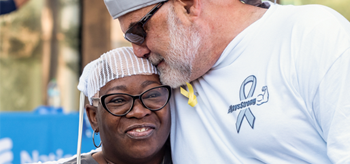Today, the National Brain Tumor Society (NBTS), in partnership with Yale Cancer Center, announced new partners for its DNA Damage Response Consortium. Joining the initiative are world-class experts in adult and pediatric neuro-oncology research from leading laboratories at St. Jude Children’s Research Hospital; New York University (NYU) Grossman School of Medicine; the University of California, San Francisco (UCSF); and the University of Minnesota. Working together, these labs aim to rapidly advance a new class of promising potential treatments that can target a brain tumor’s DNA damage response network.
“Drugs designed to attack tumors’ DNA Damage Response (DDR) networks represent a versatile class of medicines that already have demonstrated significant advances in treating several types of cancers,” said Kirk Tanner, PhD, Chief Scientific Officer of the National Brain Tumor Society. “There are multiple ways to potentially intervene and exploit brain tumors’ altered DDR pathways, as well as opportunities to combine these therapies with other treatment modalities to successfully kill cancerous cells. To fully and rapidly uncover the most promising DDR-based single and combination therapies to advance to the clinic, we’ve assembled a multi-disciplinary team that spans the bench to the bedside and learns from every patient, across the spectrum of adult and pediatric brain tumors.”
The consortium’s co-principal investigators are Dr. Ranjit Bindra, Harvey and Kate Cushing Professor of Therapeutic Radiology and Scientific Director of the Chênevert Family Brain Tumor Center at Smilow Cancer Hospital and Yale Cancer Center, and Dr. Nathalie Agar, Founding Director of the Surgical Molecular Imaging Laboratory (SMIL), Daniel E. Ponton Distinguished Chair in the Department of Neurosurgery at Brigham and Women’s Hospital, and Associate Professor of Neurosurgery, Radiology at Harvard Medical School.
The Bindra lab brings years of experience and expertise in DNA Damage Response and biomarker-driven precision medicine approaches, while the Agar lab is a pioneer in the development and implementation of integrated biomolecular and drug imaging of tissue specimens through mass spectrometry. Joining them will now be:
St. Jude Children’s Research Hospital
Project Leads: Anang Shelat, PhD; Chris Tinkle, MD, PhD; Stephen Mack, PhD
Project Focus: The team from St. Jude has expertise in DDR, chemical biology, developmental neurobiology, and screening and bioinformatics. Together, they will focus on the toughest types of pediatric brain tumors, including diffuse intrinsic pontine glioma (DIPG)/diffuse midline glioma (DMG), atypical teratoid/rhabdoid tumors (AT/RT), and childhood ependymomas. The pediatric ependymoma work will be funded through the Collaborative Ependymoma Research Network, a program of NBTS. Specifically, the team will test multiple types of DDR-inhibiting drugs like ATR, ATM, and PARP, inhibitors in addition to others in combination, with different DNA damaging agents, like chemotherapy and radiation, in laboratory models.
New York University (NYU) Grossman School of Medicine
Project Lead: Erik Sulman, MD, PhD
Project Focus: Dr. Sulman is an expert in radiation oncology and his lab uses innovative cell line barcoding and glioma stem cell models to assess the potential effectiveness of different DDR-targeting drug combinations. Dr. Sulman and his team are evaluating promising treatments across all the types of aggressive gliomas, including, glioblastoma, astrocytoma, and the notoriously difficult-to-culture oligodendroglioma. His lab is also evaluating the combination of the antidepressant Prozac with standard of care chemotherapy, building from a recent NBTS-funded discovery of possible glioblastoma survival benefits found by Dr. Paul Mischel at Stanford University.
University of Minnesota
Project Lead: William Elmquist, PhD, PharmD
Project Focus: Dr. Elmquist is a world-renowned leader in examining and modeling mechanisms that the brain’s protective barrier, known as the blood-brain barrier (BBB), uses to limit the delivery and hence, the efficacy of drugs for brain tumors. He will help consortium teams understand if promising drugs are able to cross the BBB to reach and engage their targets at appropriate therapeutic levels with pharmacokinetic/pharmacodynamic (PK/PD) testing.
University of California, San Francisco (UCSF)
Project Lead: John de Groot, MD
Project Focus: Dr. de Groot is a leader in translational medicine and in developing clinical trials of new brain tumor therapies. As part of the consortium, his lab will also bring new expertise in drug delivery methods. Specifically, Dr. de Groot’s team will compare three different methods of drug delivery: intravenous (IV), convection-enhanced delivery, and IV + low-intensity focused ultrasound.
“By leveraging the combined strengths of consortium members, we have the ability to serve as a sophisticated vehicle that biotechnology companies with DDR-targeting compounds can engage for efficient experimental drug qualification by an experienced team,” said Dr. Bindra.
The consortium launched in early 2022 and was bolstered by the addition of IQVIA, a leading global provider of advanced analytics, technology solutions, and clinical research services, as a partner in late 2022. More outstanding hospital-based laboratories are anticipated to join the consortium in 2023.
About the National Brain Tumor Society
Building on over 30 years of experience, the National Brain Tumor Society (NBTS) unrelentingly invests in, mobilizes, and unites the brain tumor community to discover a cure, deliver effective treatments, and advocate for patients and caregivers. Our focus on defeating brain tumors and improving the quality of patients’ lives is powered by our partnerships across science, health care, policy, and business sectors. We fund treatments-focused research and convene those most critical to curing brain tumors once and for all. Join us at BrainTumor.org.



